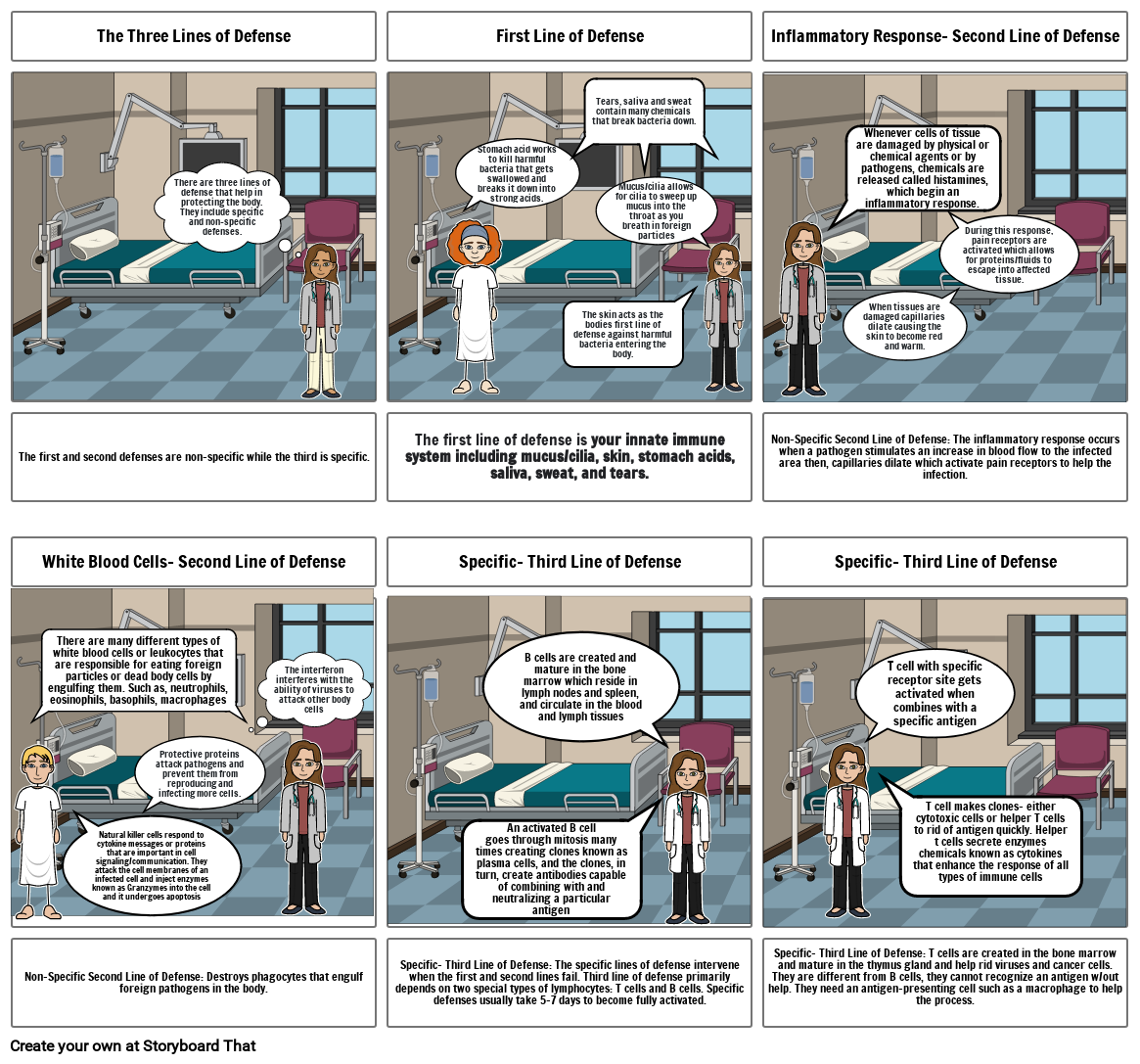The Three Lines of Defense

Text z Príbehu
- The Three Lines of Defense
- There are three lines of defense that help in protecting the body. They include specific and non-specific defenses.
- First Line of Defense
- Stomach acid works to kill harmful bacteria that gets swallowed and breaks it down into strong acids.
- The skin acts as the bodies first line of defense against harmful bacteria entering the body.
- Tears, saliva and sweat contain many chemicals that break bacteria down.
- Mucus/cilia allows for cilia to sweep up mucus into the throat as you breath in foreign particles
- Inflammatory Response- Second Line of Defense
- Whenever cells of tissue are damaged by physical or chemical agents or by pathogens, chemicals are released called histamines, which begin an inflammatory response.
- When tissues are damaged capillaries dilate causing the skin to become red and warm.
- During this response, pain receptors are activated which allows for proteins/fluids to escape into affected tissue.
- The first and second defenses are non-specific while the third is specific.
- White Blood Cells- Second Line of Defense
- There are many different types of white blood cells or leukocytes that are responsible for eating foreign particles or dead body cells by engulfing them. Such as, neutrophils, eosinophils, basophils, macrophages
- The interferon interferes with the ability of viruses to attack other body cells
- The first line of defense is your innate immune system including mucus/cilia, skin, stomach acids, saliva, sweat, and tears.
- Specific- Third Line of Defense
- B cells are created and mature in the bone marrow which reside in lymph nodes and spleen, and circulate in the blood and lymph tissues
- Non-Specific Second Line of Defense: The inflammatory response occurs when a pathogen stimulates an increase in blood flow to the infected area then, capillaries dilate which activate pain receptors to help the infection.
- Specific- Third Line of Defense
- T cell with specific receptor site gets activated when combines with a specific antigen
- Non-Specific Second Line of Defense: Destroys phagocytes that engulf foreign pathogens in the body.
- Natural killer cells respond to cytokine messages or proteins that are important in cell signaling/communication. They attack the cell membranes of an infected cell and inject enzymes known as Granzymes into the cell and it undergoes apoptosis
- Protective proteins attack pathogens and prevent them from reproducing and infecting more cells.
- Specific- Third Line of Defense: The specific lines of defense intervene when the first and second lines fail. Third line of defense primarily depends on two special types of lymphocytes: T cells and B cells. Specific defenses usually take 5-7 days to become fully activated.
- An activated B cellgoes through mitosis many times creating clones known as plasma cells, and the clones, in turn, create antibodies capable of combining with and neutralizing a particular antigen
- Specific- Third Line of Defense: T cells are created in the bone marrow and mature in the thymus gland and help rid viruses and cancer cells. They are different from B cells, they cannot recognize an antigen w/out help. They need an antigen-presenting cell such as a macrophage to help the process.
- T cell makes clones- either cytotoxic cells or helper T cells to rid of antigen quickly. Helper t cells secrete enzymes chemicals known as cytokines that enhance the response of all types of immune cells
Bolo vytvorených viac ako 30 miliónov storyboardov

